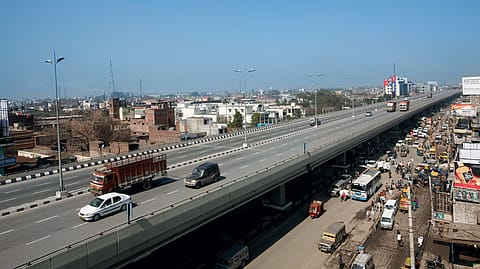India’s express logistics industry to double to $18-22 bn by FY30: EICI-KPMG
The express logistics market encompasses cargo handling, multi-modal transportation, warehousing, last-mile delivery, and customs clearance, making it an integral part of India’s supply chain ecosystem.

India’s express logistics sector has emerged as a critical pillar of economic growth, digital commerce, and job creation. The industry was valued at around $9 billion in FY25, according to an EICI-KPMG India report, growing by a steady CAGR of 12–15% since FY17. The report forecasts that the express logistics sector will reach $18–22 billion by FY30, seeing a two-fold rise, and creating 65-75 lakh jobs.
This is particularly happening because of the boom in e-commerce, MSME exports, and rapid digital transformation.
The express logistics market encompasses cargo handling, multi-modal transportation, warehousing, last-mile delivery, and customs clearance, making it an integral part of India’s supply chain ecosystem.
The sector is also a significant revenue contributor, generating an estimated $1–1.5 billion in GST collections and $650 million in customs duties in FY24. Additionally, the report reveals that it supports between 28 lakh and 30 lakh jobs across both urban and rural regions.
The domestic express segment accounts for nearly 70% of the total market, valued at $6.3–6.5 billion, and is largely driven by surface transport. Meanwhile, the international express segment, which makes up around 30% of the market, is also set to see expansion on cross-border e-commerce, MSME digitisation, and manufacturing exports.
Changing consumer behaviour in the post-pandemic era, coupled with smartphone adoption and the growth of Tier II and Tier III cities, has reshaped the industry.
India’s booming e-commerce market, valued at $1,000 billion in FY25, has seen its online share climb from 3% in FY19 to 7% in FY25. Shipments rose sharply from 1.1 billion to 5 billion over the same period.
The report reveals that, business to- and consumer to-consumer categories account for more than half of the logistics market, surpassing the conventionally popular B2B segment.
This is particularly because of the rise of quick commerce, hyperlocal delivery, and direct-to-consumer (D2C) brands, forcing logistics providers for shorter delivery timelines and to invest heavily in technology, automation, and urban infrastructure.
Yet, per capita B2C e-commerce spending in India remains low at $50, signalling significant headroom for growth. Express logistics contributes nearly 60% of the B2C logistics market, valued at $4–4.5 billion.
(INR CR)
This leaves massive headroom for growth for exporters given the international trade lanes continue to be dominated by the U.S., UK, Europe and Australia.
Government initiatives such as Bharatmala Pariyojna, GST, E-way Bill, and FASTag have been instrumental in enhancing efficiency in road logistics and inter-state connectivity. Improved payment systems, customs reforms, and trade facilitation policies have boosted the reliability and scalability of international shipments.